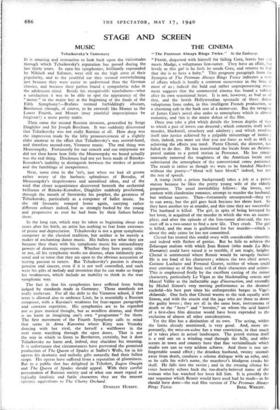THE CINEMA
.4 The Postman Always Rings Twice." At the Embassy.
" FRANIC, disgusted with himself for failing Cora, leaves her and meets Madge, a voluptuous lion-tamer. They have an affair, hut
lovely as this girl is he feels he needs Cora, and returns to find
that she is to have a baby." This pregnant paragraph from the Synopsis of The Postman Always Rings Twice indicates a state of affairs which is hardly a common occurrence in the lives of most of us ; indeed. the bald and rather unprepossessing state- ment suggests that the commercial cinema has found a subject after its own sensational heart. It is not, however, as bad as all that, and the lavish Hollywoodian spectacle of three dozen voluptuous lions cedes, in this intelligent French production, to a charming cub in the back seat of a motor-car. But the savagery of James Cain's novel also cedes to atmosphere which is almost romantic, and this is the major defect of the film.
Once you take a plot which details the lowest depths of vice to which a pair of lovers can descend ; which concerns itself with murder, blackmail, treachery and adultery ; and which resolves itself into justice achieved by a palpable miscarriage of justice ; then, indeed, you must see that you use force as well as skill in achieving the effects you need. Pierre Chenal, the director, has failed to do this. He has transferred the locale from an Arizona petrol station to a petrol station in Provence. He has simul- taneously removed the toughness of the American locale and substituted the atmosphere of the conventional crime passionel. The result is rather as though w were to be handed Macbeth without the poetry—" blood will have blood," indeed, but not the rest of speech.
A tramp (with a prison background) takes a job at a petrol station because he likes the pretty young wife of the elderly proprietor. The usual inevitability follows; the lovers, not content with clandestine romance, attempt to murder the husband, but without success. Then—fortunately unsuspected—they try to run away, but the girl goes back because her shoes hurt. So they have another try at murder, and this time they are successful. The husband is killed. The girl, in spite of being betrayed by her lover, is acquitted of the murder in which she was an accom- plice; and after the episode of the lion-tamer aforesaid, the two start off in a two-seater to find a new life. They crash. The girl is killed, and the man is guillotined for her murder—which is about the only crime he has not committed.
Chenal has treated this sordid story with considerable sincerity, and indeed with flashes of genius. But he fails to achieve the Zolaesque realism with which Jean Renoir (who made La Bite Humaine) could have raised it to terrible, if not tragic, heights. Chenal is sentimental where Renoir would be savagely factual. He is too fond of his characters ; witness the two chief actors, Corinne Luchaire and Fernand Gravet, neither of whom could ever convince us of the basic evil of their characters and actions. This is emphasised firstly by the excellent casting of the minor characters, particularly Le Vigan as the blackmailing cousin and Marcel Vallee as the ineluctable juge d'instruction, and secondly by Michel Simon's very moving performance as the doomed
cuckold—his best part since his unforgettable bargee in Vigo's
Atlantide. One feels that Chenal warms to the task equally with Simon, and with the cousin and the juge who are there to doom
the guilty lovers ; they are all in the same boat, instruments of death to the " hero " and "heroine," on whom 'the acid hatred of a first-class film director would have been expended to the exclusion of almost all other considerations.
Yet the film has a distinction of its own. The acting, within the limits already mentioned, is very good. And, more im-
portantly, the mise-en-scine has a true conviction, in that much
of it takes place in actual landscapes. The petrol station itself is a real one on a winding road through the hills, and other scenes in town and country have that fine verisimilitude which studio sets can so very seldom achieve. And there is one un- forgettable sound effect ; the drunken husband, twenty seconds away from death, conducts a solemn dialogue with an echo, and, as he calls his wife's name, the murderer's bludgeon cracks his skull. He falls into the ravine ; and in the ensuing silence his voice hoarsely echoes back the too-dearly-beloved name of the
woman who has watched her lover kill him. It is possibly the one sequence which Renoir would have used had he made—as he should have done—the real film version of The Postman Always


































 Previous page
Previous page